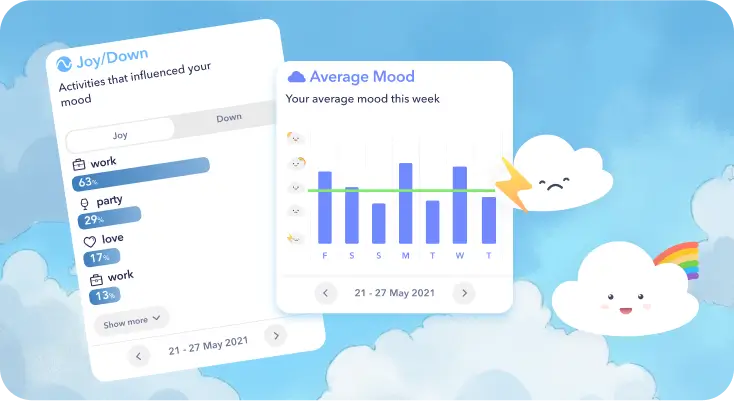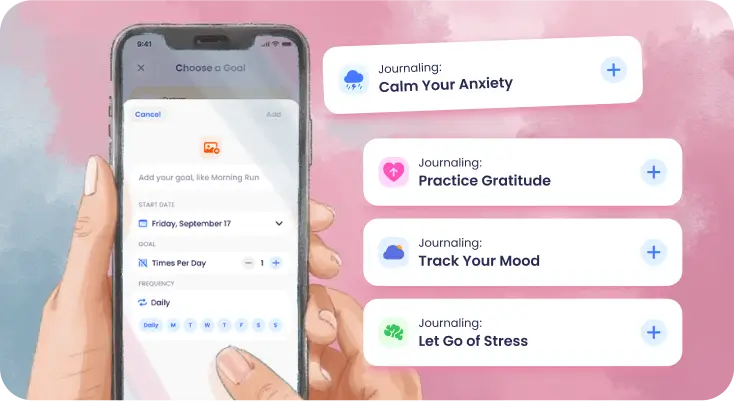“These feelings are overwhelming. Whether I’m feeling anxious or angry, nothing seems to help, and it’s so difficult to regain control.”.
This is a quote by Anna, an office worker and a mum of two, who struggled to manage her emotions in stressful situations. She agreed to share her story of stress and anxiety that had a happy ending.
In this article, we’ll analyze Anna’s case and provide more ways to calm down that could be helpful for people facing similar challenges. We’ll explain how to relieve anxiety in a few minutes and cultivate balance in the long term.
In my experience — Anna’s story of panic attacks
I’ve been too emotional since childhood. I remember how difficult it was to handle negative thoughts right before an important test, whenever I spoke in front of the class, or when my mom asked me about my poor grades. My heart was always racing, and my chest tightened.
Now I have 2 awesome kids, but nothing seems to change. I still feel overwhelmed, no matter what happens, while feeling stressed has become typical to me. When you’re raising children and life throws challenges your way, it seems impossible to handle.
So, about 3 months ago, I had my first panic attack. “I should be able to stop it!” — This is what I decided immediately. — “I want a stronger mum for my kids.” So, now I’m working with a therapist and trying to figure out how to develop emotional strength. I already use some of Breeze’s features, so I would be happy to discover more ways to reduce tension in the present moment.
How to manage stress effectively — Science-backed insights for a calm mind
Thanks to talking to Anna, we delved deeper into the world of calming techniques and ways to manage complex feelings from the beginning. Thus, below, we provide a comprehensive guide of evidence-based tools and simple daily practices to help you calm your mind and manage anxiety more effectively.
1. Do deep breathing exercises to reduce your heart rate and blood pressure
Slowing down your breathing can lower stress by calming your body’s “fight or flight” response and activating the parasympathetic nervous system. [1] As a result, heart rate and blood pressure go down [2], while the level of stress hormones also lowers. [3]
Here are a few breathing techniques that might be helpful to relieve stress and relax your body:
Box Breathing (4-4-4-4 method)
- Take a deep breath for 4 seconds
- Hold for 4 seconds
- Exhale slowly for 4 seconds
- Hold for 4 seconds.
4-7-8 Breathing
- Inhale for 4 seconds
- Hold for 7 seconds
- Exhale slowly for 8 seconds
Diaphragmatic breathing (belly breathing)
Take deep breaths into your belly, letting it expand as you inhale and deflate as you exhale. This encourages full oxygen exchange and helps reduce anxiety.
Is it challenging for you to calm down?
2. Change focus to something pleasant
Studies prove that mindfulness helps people feel better overall, reduces emotional ups and downs, and makes it easier to stay calm and in control. [4] While staying in the present moment when something triggering happens might be challenging, you can always get involved in more pleasant activities.
Here are some quick ways to do that in just 2 minutes:
- Look outside and notice something beautiful
- Listen to your favorite calming music
- Do a quick mindfulness meditation
- Think about a happy memory
- Write a to-do list of pleasant things for this week
- Smell something nice nearby
You can also try relaxation games from Breeze. They can help you quickly calm down and reduce stress and anxiety. And the best part is, they’re always with you whenever you need them.

3. Go get some fresh air daily
According to research published in Urban Forestry & Urban Greening, exposure to the natural environment can reduce stress. [5] Simply put, even a short walk outside for 15 minutes daily can help you clear your mind and feel more relaxed. Try to focus on the sights, sounds, and smells around you and fully embrace the moment while walking, as it can serve as mindfulness meditation.
4. Spend time with a close one
Positive social support can enhance your resilience to stress. [6] While this is true in the long term, turning to a trustworthy person for support can improve your mental state and reduce the body’s stress response. Thus, if you need a quick reset, it’s better to call, message, or meet with a close friend or a family member.
5. Practice grounding techniques
European Society of Medicine states that grounding provides immediate benefits, such as the regulation of heart and respiratory rates, reduction of muscle tension, and calmer brain wave patterns. [7] So, if you want to relax your body and clear your mind, here are some powerful techniques that can help you get back to the present:
3-3-3 rule for anxiety
This step-by-step approach can help you quickly calm down during moments of stress and overwhelm. Even more, you can use the 3-3-3 method anywhere because it’s rather simple:
- Name 3 things you see
- Name 3 sounds you hear
- Move 3 body parts
This is effective because it interrupts anxious thoughts and helps you shift focus.
5-4-3-2-1 method
You need to name:
- 5 things around you
- 4 things you can touch
- 3 things you hear
- 2 things you can smell
- 1 thing you can taste
This method also interrupts anxious thoughts and helps anchor you.
Progressive muscle relaxation
Tighten one part of your body for a few seconds, then let it go and feel it relax. Start with your feet and move up to your head. This relaxation technique helps your body feel less tense, and your mind feel calmer.
6. Write down your worries
Journaling has proven to be another effective tool to renew your emotional energy. [8] You can try to do it in your notebook or right on your phone using the Breeze app. Here, you’ll find open questions to release worry, overcome anxiety, and nurture gratitude. It’s better to make this practice a part of your daily life routine, but even one-time journaling can provide immediate relief.

7. Chew gum to manage anxiety
According to the research, chewing gum is thought to increase concentration via a reduction in stress and anxiety. [9] This happens because the repetitive chewing motion can help relax your jaw muscles, lower your heart rate, and distract your mind from anxious thoughts. So, if you’re feeling stressed or angry, it might be a good idea to grab a piece of chewing gum to shift your focus.
8. Challenge your thoughts
Scientists define this approach as a therapeutic technique for overcoming negative thoughts by replacing them with a more hopeful “reframed thought.” [10] This means noticing what you’re feeling and then asking yourself if there’s another way to look at the situation. For instance, you can start with questions like:
- What would I tell a friend in this situation?
- What’s the worst that could happen?
- How likely is that?
- What can I learn from this?
- What can I do about the situation?
It’s better to write down the answers and review them later. If the situation repeats, you’ll be able to see another perspective and focus on more positive outcomes.
Expert Insight
“One of the best reframing exercises that I have used for both my clients and myself is called the “Zoom Out” reframe. It’s rooted in cognitive-behavioral principles. To do this reframe, first name what you are feeling and why. So, for instance, you might say, “I feel stressed because I have a big project to do today at work.”
Next, zoom out, or ask yourself how important this event or thing is in the overall picture of your life. Will it matter in a month or even a year from now? Finally, reframe it. Tell yourself that the stress is only temporary and will be over soon. This works because it helps you think about the bigger picture. Often, things seem larger than they really are. This reframe helps put stressors in perspective.”
Emily Mendez
Mental health professional
9. Spend time with a pet
Pets may decrease stress and improve a person’s heart and mental health. Moreover, interacting with animals has been shown to decrease levels of cortisol (a stress-related hormone) and lower blood pressure. [11] Thus, if you live with an animal or have the chance to spend time with one, take a moment to play, cuddle, or simply be with them.
How to cultivate a calm state in the long run
While all the above approaches can help to reduce mental and physical symptoms of stress, as well as enhance overall mood, it’s vital to think more deeply about building lasting habits. This is what Anna and people with the same challenges can do to stay calm in daily life.
1. Analyze what makes you feel overwhelmed
Sometimes, one particular situation or pattern can regularly trigger a stress response. For instance, Anna shared that she hates work meetings and the need to communicate with strangers, which is necessary in her job and when raising two children.
A mood tracker from Breeze can make noticing this pattern much simpler and smoother. This is how it works:
- You track your mood in the app and notice why you feel a certain way.
- After some time, you analyze mood insights and think about why various situations cause specific emotions.
- Once you know the issue, it might be much easier for you to look for alternative approaches and change your life accordingly.
In Anna’s case, she can start by preparing mentally before meetings or discussing flexible ways to handle communication at work. Moreover, she can delegate some children-related communication to her husband and focus on self-care more.

2. Get regular exercise
Physical activity is effective in coping with everyday stress, according to the study. [12] This means that you not only improve physical health but also take care of your overall well-being and learn to control your emotions. Even a quick walk daily can be beneficial and bring change in the long run.
Even more, training often involves deep breathing exercises, especially if you do activities like yoga or pilates. They help calm the nervous system and increase body awareness, making it easier to manage stress throughout the day.
3. Create calming daily routines
Keeping a steady daily routine helps reduce the risk of anxiety and depression by supporting your ability to cope with stress. [13] This feels like even in the hardest times, you have something to lean on and calm down.
To build a consistent routine and introduce more nurturing habits, you can use the Breeze app. It allows you to create specific daily tasks you want to follow (like engaging in physical activity or breathing exercises). The app provides regular notifications to remind you and keep you on track. Also, ticking these tasks from your to-do list feels rewarding and inspiring as you see how life changes gradually.

4. Take care of your mental health
If you feel like life is still too challenging to handle, it might be better to reach for professional help. A mental health professional will support you in tough moments and show you how to approach challenges with self-compassion. For some people, it can be the best place to feel heard and appreciated, for others it will lead to discovering what causes anxiety.
Anna did that from the very beginning, and now she’s learning to calm down faster in the moment, as well as keep grounded for the whole time. “Now I feel more balanced and have a relaxed state of mind thanks to regular therapy and using Breeze,” she says. Getting support doesn’t mean you’re weak — it means you’re strong enough for self-compassion.
Emily Mendez, M.S., Ed.S, shares the approaches you can use when learning to handle overwhelming emotions. “One of the best “in the moment” strategies that a person can use comes from dialectical behavioral therapy (DBT). It is called radical acceptance. When our emotions feel too overwhelming, our first instinct is to fight them. However, with radical acceptance, rather than fighting or shutting down, you acknowledge that the moment is painful and that you don’t like it. But you will accept it. This works because resistance only adds to the suffering. A long-term strategy for handling overwhelming emotions that I find to be particularly effective is reframing. Reframing involves intentionally seeing the situation from a different perspective. Over time, this helps you come to view painful events in a more gentle, kinder way.”
To sum up
A journey of feeling better always starts with paying attention to what you feel. Sometimes, it can be a small step that improves your life more than you expect. Anyway, calm offers us strength and clarity, qualities so important that you need to nurture them daily. Try these simple steps and Breeze app features to find what works best for you. And remember that even on tough days, you are empowered to choose calm and resilience.
Sources
- Bentley TGK, D’Andrea-Penna G, Rakic M, Arce N, LaFaille M, Berman R, Cooley K, Sprimont P. “Breathing Practices for Stress and Anxiety Reduction: Conceptual Framework of Implementation Guidelines Based on a Systematic Review of the Published Literature.” Brain Sci. 2023
- Susiana Candrawati, Erlangga Aditya Ganesha, Rizqi Hendra Setiawan, Dyah Woro Dwi Lestari, Wiwiek Fatchurohmah. “Slow, Deep Breathing Exercise Lowers Blood Pressure and Stress in Medical Students.” 2024
- Örün D, Karaca S, Arıkan Ş. “The Effect of Breathing Exercise on Stress Hormones.” Cyprus J Med Sci. 2021
- Keng SL, Smoski MJ, Robins CJ. “Effects of mindfulness on psychological health: a review of empirical studies.” Clin Psychol Rev. 2011
- Wenfei Yao, Xiaofeng Zhang, Qi Gong. “The effect of exposure to the natural environment on stress reduction: A meta-analysis.” Urban Forestry & Urban Greening. 2021
- Ozbay F, Johnson DC, Dimoulas E, Morgan CA, Charney D, Southwick S. “Social support and resilience to stress: from neurobiology to clinical practice.” Psychiatry (Edgmont). 2007
- Laura Koniver, MD. “Grounding To Treat Anxiety.” 2024
- Smyth JM, Johnson JA, Auer BJ, Lehman E, Talamo G, Sciamanna CN. “Online Positive Affect Journaling in the Improvement of Mental Distress and Well-Being in General Medical Patients With Elevated Anxiety Symptoms: A Preliminary Randomized Controlled Trial.” JMIR Ment Health. 2018
- Yaman-Sözbir Ş, Ayaz-Alkaya S, Bayrak-Kahraman B. “Effect of chewing gum on stress, anxiety, depression, self-focused attention, and academic success: A randomized controlled study.” Stress Health. 2019
- Sharma, Ashish & Rushton, Kevin & Lin, Inna & Wadden, David & Lucas, Khendra & Miner, Adam & Nguyen, Theresa & Althoff, Tim. (2023). “Cognitive Reframing of Negative Thoughts through Human-Language Model Interaction.”
- News in Health. “The Power of Pets.” 2018
- Sharon-David, Hilla & Tenenbaum, Gershon. (2017). “The Effectiveness of Exercise Interventions on Coping with Stress: Research Synthesis. Studies in Sport Humanities.”
- Li TW, Liang L, Ho PL, Yeung ETF, Hobfoll SE, Hou WK. “Coping resources mediate the prospective associations between disrupted daily routines and persistent psychiatric symptoms: A population-based cohort study.” J Psychiatr Res. 2022
Disclaimer
This article is for general informative and self-discovery purposes only. It should not replace expert guidance from professionals.
Any action you take in response to the information in this article, whether directly or indirectly, is solely your responsibility and is done at your own risk. Breeze content team and its mental health experts disclaim any liability, loss, or risk, personal, professional, or otherwise, which may result from the use and/or application of any content.
Always consult your doctor or other certified health practitioner with any medical questions or concerns
Breeze articles exclusively cite trusted sources, such as academic research institutions and medical associations, including research and studies from PubMed, ResearchGate, or similar databases. Examine our subject-matter editors and editorial process to see how we verify facts and maintain the accuracy, reliability, and trustworthiness of our material.
Was this article helpful?






